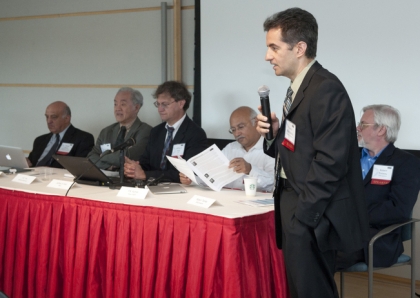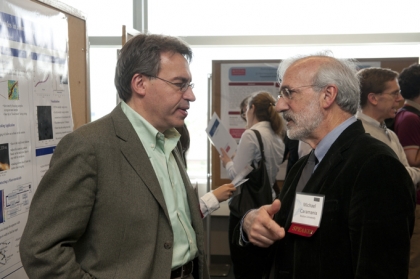Systems Science: Shaping Society’s Future – Summary news article
CISE Symposium Celebrates Organization’s First Ten Years

For the past 10 years, the Boston University Center for Information and 系统工程 (CISE) has served as an interdisciplinary research and education center advancing leading-edge concepts and practical applications involving the modeling, design, analysis, and management of complex systems. During that period, CISE has seen its faculty—drawn from the College of Engineering, the College of Arts & Sciences, and the School of Management—grow from five to 35 and its annual external research funding rise to $5 million, resulting in major advances in robotics, automation and control; communications and networking; computational biology and medicine; information sciences; and production, service and energy systems.
To celebrate faculty and student achievements over the past decade and explore upcoming challenges and opportunities in the field, CISE organized a daylong symposium, “Systems Science: Shaping Society’s Future,” on May 10.
Held in the Photonics Center Colloquium Room, the symposium featured presentations and a panel discussion by information and systems engineering leaders from across the country, and a poster session showcasing CISE graduate student research. Attendees discussed recent advances in systems science that support improved decision-making and could lead to more highly organized, controlled and optimized “smarter” systems for transportation and civil infrastructure in urban areas, energy and power systems and healthcare systems.
“In the next 30 or 40 years, there will be another three billion people on the planet,” said Dean Kenneth R. Lutchen, “and the great majority will drive two major challenges to the economy and create two major economic opportunities for innovation: (1) they will cluster around urban centers, and (2) they will create a huge explosion in healthcare needs for society, and meeting both of these challenges will require information and systems engineering innovations. This symposium is a perfect reflection of how CISE will bridge the basic sciences to applications so that society benefits.”
Smart Cities: Transportation and Urban Infrastructure
To illustrate how systems science is shaping the future of transportation and city life, Pravin Varaiya, professor of electrical engineering and computer sciences at the University of California, Berkeley, described a wireless sensor platform for vehicle detection cities could use to reduce traffic congestion and accidents; Professor Venkatesh Saligrama (ECE, SE) discussed a video surveillance method that he developed that uses statistical analysis of pixel-level features to efficiently monitor suspicious objects in cluttered urban environments; and 系统工程 Division Head/Professor Christos Cassandras (ECE) described a “smart parking” wireless sensor network system that he and Yanfeng Geng (SE, PhD’13) designed to enable drivers to electronically reserve parking spots.
“From the point of view of a city, parking space utilization increases, the city can make more money and congestion will go down,” said Cassandras. “In a nutshell, the idea is to change the mindset from letting the driver make decisions to providing a system that makes good optimal decisions for you.”

他
Energy and Power Systems
Demonstrating how systems science is shaping the next generation of energy and power systems, Yoni Ben-Meshulam, a data scientist at Opower, explored how his company is transforming energy usage data from more than 50 million homes into actionable information enabling more efficient energy consumption; Eugene Litvinov, senior director of Business Architecture and Technology at the ISO New England, highlighted his vision of a more flexible, reliable and resilient electric power grid; and Professor Michael Caramanis (ME, SE) set forth an economically viable, algorithm-driven scheme by which the smart grid could exploit synergies between renewable yet highly intermittent sources of electricity such as wind and solar, and electronic devices from smart appliances to plug-in hybrid electric vehicles.
“It’s a good idea to think of the smart grid as something that’s holistic, covering everything from centralized generation to transmission to distribution, going all the way to our meters and appliances,” said Caramanis. “Automation and measurement will play a very big role in the evolution of the smart grid, and this provides fertile ground for control and systems science to make a difference.”
新兴市场